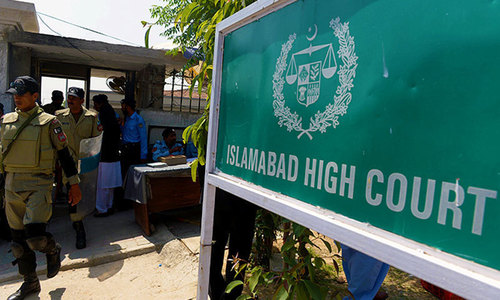ISLAMABAD: The Supreme Court will start the year 2018 with the hearing of as many as 13 petitions challenging the Elections Act, 2017, which allowed a disqualified parliamentarian to hold party office and enabled ousted prime minister Nawaz Sharif to re-emerge as president of his own faction of the Pakistan Muslim League.
These petitions had been earlier returned by the registrar’s office on the grounds that the petitioners had directly approached the apex court instead of availing remedies by appropriate forums.
Chief Justice of Pakistan Justice Mian Saqib Nisar, however, overruled the objection during a hearing in his chamber.
Parliament in October passed the Elections Act, 2017, amid a strong protest from the opposition parties.
Mr Sharif resigned as prime minister in July after the Supreme Court disqualified him over unclaimed salary from the company of his own son.
Nawaz Sharif’s opponents Imran Khan, Sheikh Rashid and Jamshed Dasti among petitioners
He was also forced to step down as president of PML-N, though he kept control of the party and installed Shahid Khaqan Abbasi as prime minister. However, after the promulgation of Elections Act, 2017, in October Mr Sharif was re-elected PML-N president.
Most of the petitioners are political opponents of Mr Sharif, including Pakistan Tehreek-i-Insaf (PTI) chairman Imran Khan, Pakistan Peoples Party (PPP), Sheikh Rashid Ahmed of the Awami Muslim League, Jamshed Dasti and some small political parties.
The apex court’s bench comprising Chief Justice Nisar, Justice Faisal Arab and Justice Ijazul Ahsan would hear the petitions on Monday (Jan 1, 2018).
In his petition, Mr Rashid pleaded that the Sharif-specific amendment to the law was mala fide and unconstitutional since it was introduced to accommodate only one person, who had already been disqualified by the Supreme Court under Article 62(1)(f) of the Constitution.
The petition argued that the act of making Mr Sharif head of the PML-N was against Articles 62, 63 and 189 of the Constitution.
He maintained that an individual, who had been disqualified by a five-judge Supreme Court bench, had become head of the largest political party of the country and would now be running the party’s affairs.
This development not only affects the public at large, but also the entire country, since what he cannot do inside the parliament, he will still be able to do while remaining outside parliament.
The counsel highlighted that under the July 28 judgement in the Panama Papers case, the Supreme Court had held that it was the right of the people to be governed by honest leaders.
Meanwhile, the PPP, through its secretary general Sardar Latif Khosa, has sought a declaration from the Supreme Court that the PML-N government should be restrained from governance until the removal and replacement of Mr Sharif with an eligible person.
The petition also seeks directives for the Election Commission of Pakistan to remove the name of Mr Sharif as head of the PML-N from the notified list of enlisted political parties.
Published in Dawn, December 30th, 2017













































